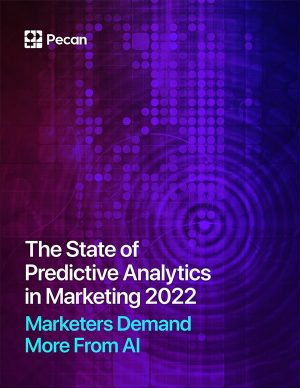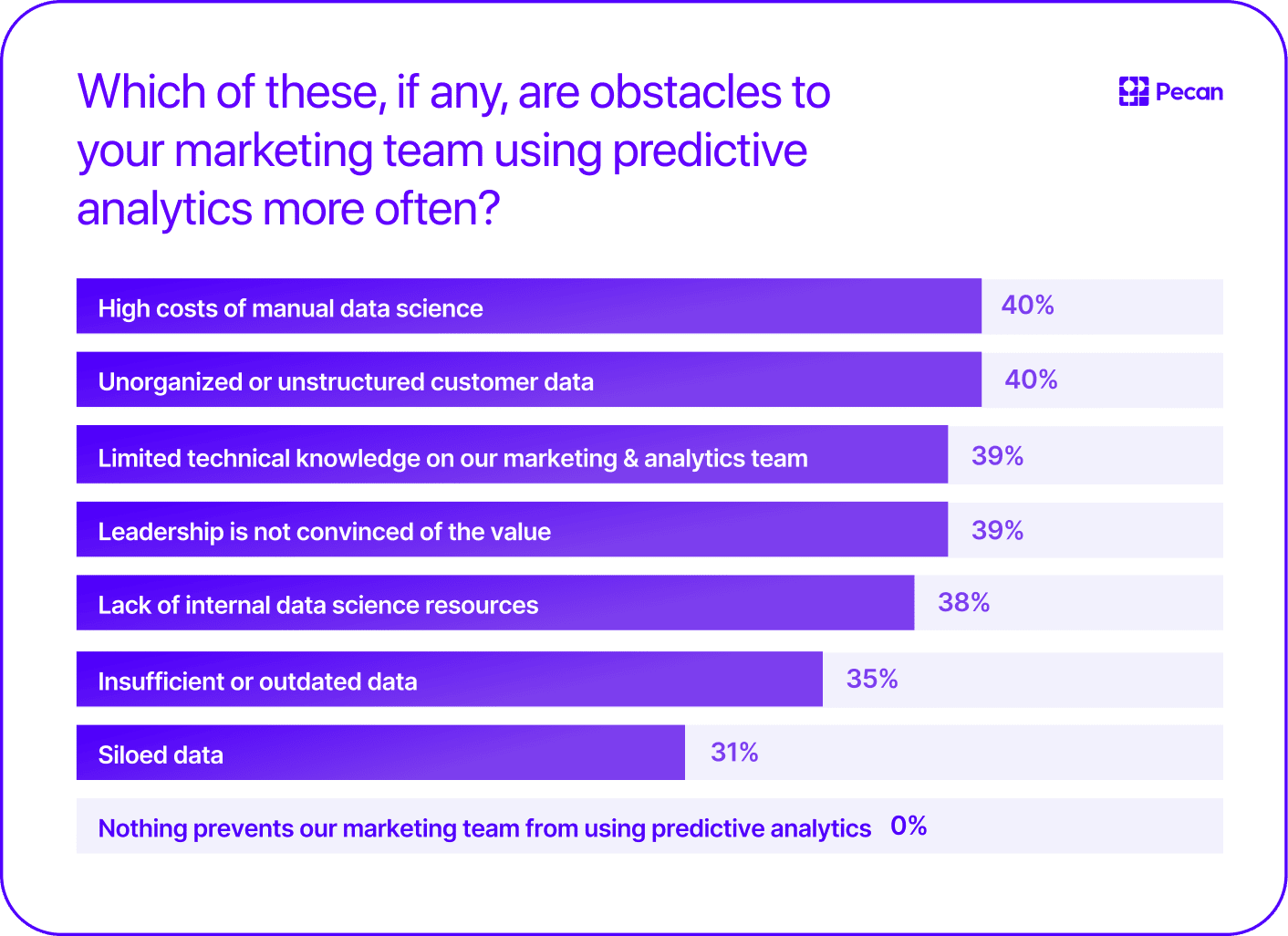I’ve seen countless trends and buzzwords come and go throughout my 15-year marketing career. Some new marketing approaches are short-lived despite their initial promise. But some stick around and demonstrate lasting value over time.
Depending on which origin story you prefer, data-driven marketing is now at least 50 years old. I am convinced that we are yet to see the full unfolding of its potential – not only because we collect more data every day, but also because new emerging techniques make the discovery of pertinent insights so much more accessible. That’s especially true now that AI-powered predictive analytics brings rich foresight into marketing strategy and decision-making.
I’m proud that Pecan today released a new research report, The State of Predictive Analytics in Marketing 2022. The report — now available to download — is our first annual report on how marketers adopt and use predictive analytics. This year, in partnership with Wakefield Research, we surveyed 250 U.S. marketing executives at companies with annual revenue of $100M+. We wanted to learn more about their experiences with data science and predictive modeling, especially for guiding effective marketing efforts and predicting customer behavior.
Marketing leaders lack a universal playbook for implementing AI
Our research found that marketing leaders want more from AI and data science. There’s no single, established playbook for implementing data science and AI in organizations, resulting in many approaches — and with that, much frustration.
The marketing leaders we surveyed have encountered challenges in aligning their teams’ needs and questions with the expertise and availability of data science teams. They often find themselves with outdated models built on incomplete or incorrectly selected data. Those models may never be maintained or updated.
Our survey responses for the question: Which of these, if any, are obstacles to your marketing team using predictive analytics more often?
Marketing organizations rely on data science teams because they usually don’t have the technical expertise to build AI capabilities. However, the lack of alignment with data science has left many marketers feeling like predicting customer behavior is “guesswork.” As a result, they don’t feel they can quickly pivot or adjust plans as customer preferences and the market change.
Our survey results also suggest that marketers find many “insights” from their marketing analytics to be less than ideal for informing marketing campaigns and strategy. Data analysts have long been tasked with identifying interesting data points or trends in historical data that illuminate business questions. But today, a turbulent market and fickle consumer behavior require a much more proactive and informed approach. Instead of pondering the past for overly generalized benchmarks, teams need to look into the future for valuable foresight.
In our study with Wakefield, marketing leaders expressed that they would like to use AI-powered predictive analytics to obtain insights that not only shed additional light on high-level marketing goals but also enable them to achieve a specific set of KPIs.
Improving how marketing teams use AI: three keys
I hope you’ll read the rest of the report to get all the details and more context on these key findings. As a marketing leader, I know my colleagues will find that the results resonate with their experiences. To move the conversation forward, I want to offer three significant opportunities to help us all improve our use of AI-powered predictive analytics in our orgs.
- Bring data science capabilities into marketing teams. Data science traditionally has required dedicated experts who could hand-code predictive models. But today’s innovative technologies make accurate, powerful AI and machine learning far more accessible to other data professionals, including data analysts within marketing teams. Additionally, these people know the marketing team’s data and needs the best. Our survey revealed that working with data science resources outside of marketing has been frustrating for many. Resolve this challenge by empowering marketing’s own data analysts to use data science capabilities.
- Generate individual-level predictions for each customer to better understand, segment, and optimize your audience, messaging, channels, creative, and offers. Moreover, a platform using explainable AI models can let you know which factors matter the most to each prediction and help you further refine your approach, while leaving any human biases behind. Only a few predictive analytics platforms offer that level of specificity. But if you want to evolve beyond “guesswork” and keep pace with customers’ constantly evolving behavior, this level of granularity provides both agility and confidence.
- Become laser-focused on your most critical KPIs by having your team generate predictive insights that speak directly to those goals. Data professionals love to explore data and dig deeper. However, all that digging isn’t productive if it doesn’t ultimately help you achieve marketing results. A predictive analytics platform that focuses on common marketing concerns, such as improving return on ad spend despite an increase in acquisition costs and channel mix complexities, or balancing retention efforts with spend efficiencies, can help ensure that your investment in predictive analytics provides meaningful ROI.
If implementing predictive analytics has been an arduous task for your team, or if it’s been so daunting that you haven’t even started yet – don’t despair. I hope you’ll read our full survey report and remember that real solutions to this challenge are available today.
Just don’t try to boil the ocean, and rather start with a meaningful use case that allows you to test and prove the value of predictive modeling quickly. That will help you build confidence and trust for this highly effective type of AI within your team, and find the right approach for a broader rollout to continue improving execution of acquisition and retention strategies, while consistently obtaining impressive results.
Give it a serious shot. When you do, I’m confident you’ll agree that AI and predictive analytics have earned their place as a critically important technology in the marketing world.
We’re here to help you and your marketing team take the next steps toward AI adoption. Get in touch for a quick, easy use-case consultation.







